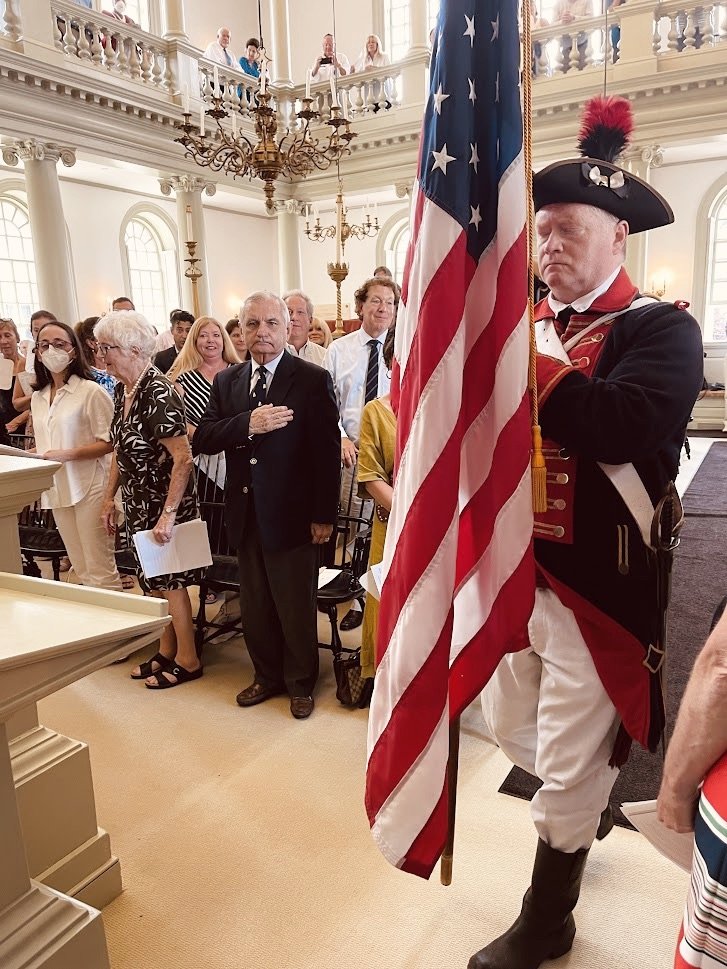Touro Synagogue holds unique celebration of the Washington letter
NEWPORT – The packed audience at Touro Synagogue was engrossed on Aug. 21 as two eloquent speakers celebrated, in unique ways, the exchange of letters in 1790 between the Hebrew Congregation of Newport and George Washington, the newly elected president of the United States of America.
For the first time in the 75-year history of this celebration, neither guest speaker addressed the letters directly – but the letters’ message of the importance of religious freedom for all rang as loudly as ever.
The celebration began with opening remarks and an invocation, followed by a public reading of the two historic letters. The first letter, written on Aug. 17, 1790, by Moses Seixas, Touro Synagogue’s warden, was addressed to George Washington and expressed the anxiety of an oppressed minority. Seixas sought assurance that the “children of the stock of Abraham” would find in the new nation, “Liberty of conscience, and immunities of Citizenship.”
In his response, President Washington wrote that the new country “gives to bigotry no sanction, to persecution no assistance and requires only that they who live under its protection should demean themselves as good citizens, in giving it on all occasions their effectual support.”
With these stirring words, Washington gave his official endorsement to freedom of religion one year before the adoption of the Bill of Rights.
Did it make a difference that it was President Washington who penned that second letter, asked Kevin Butterfield, the keynote speaker and the executive director of the Fred W. Smith National Library for the Study of George Washington, in Mount Vernon, Virginia.
Butterfield assured the audience that for Americans of the time, it made a crucial difference. He said Washington was a special leader among the Founding Fathers, both a towering figure and so beloved that young couples named their babies George Washington.
Furthermore, Butterfield said, Washington was held in such high esteem that he was often compared to Moses bringing his people to the Promised Land. But Washington did Moses one better, he said: Moses led the Israelites into sight of the Promised Land, but Washington put the Americans in full possession of their land.
In addition, according to Butterfield, Washington brought a sense of permanence and steadiness to the young nation. He was a “stabilizing presence” in the newly formed country during a time when many of the laws that would hold us together as a nation were in flux and the state of the nation as a united country felt uncertain to some.
Butterfield concluded his presentation by saying that with Washington’s support, the notion of religious freedom in the new republic was no radical position, but simply the way it should be.
The day’s second speaker, New York Times best-selling author Judy Batalion, was presented with the Judge Alexander George Teitz Award, which is given annually to an individual or institution that best exemplifies a contemporary commitment to the ideals of religious and ethnic tolerance and freedom.
Batalion is the author of “The Light of Days: The Untold Story of Women Resistance Fighters in Hitler’s Ghettos.” In her moving speech, she recounted the harrowing stories of brave young Jewish women who fought the Nazis during World War II.
She said that after witnessing the brutal murders of their families and neighbors, a cadre of Jewish women in Poland, many still teenagers, transformed Jewish youth groups into resistance cells to fight the Nazis. Batalion explained how these “ghetto girls” worked tirelessly, craftily and relentlessly to oppose the Nazis, paying off Gestapo guards, hiding revolvers in teddy bears, bombing German train lines, destroying their water supplies and more.
Batalion’s dedication to bringing these women’s stories to light exemplifies a commitment to religious and ethnic tolerance and freedom, said Andrew Teitz, son of Judge Teitz and the presenter of the Teitz award.
The Aug. 21 celebration also included the awarding of The Aaron and Rita Slom Scholarship for Freedom and Diversity, which annually provides $1,000 college scholarships to two high school seniors. The award winners created an interpretive written work focusing on the ideas in the Washington letter as seen in the present time.
The scholarship fund’s co-founder, Rita Slom, was this year’s reader of Washington’s letter. David Epstein, son of the congregation’s late beloved member Barbara Epstein, read Seixas’ letter.
In the middle and at the conclusion of the day’s program, the audience was treated to musical performances by baritone Trevor S. Neal and pianist Suzanna Laramee. They performed “Zion’s Wall,” by the 20th-century American composer Aaron Copeland, and “My Days Have Been So Wondrous Free,” composed by Francis Hopkinton, a friend of Washington’s and a signer of the Declaration of Independence. This song, which set to music a poem by Irish clergyman Thomas Parnell, is considered America’s earliest secular composition, and expresses the joy of freedom from fear and intimidation that the Hebrew Congregation must have felt when it received Washington’s letter:
My days have been so wondrous free,
the little birds that fly
with careless ease from tree
to tree were but as blest as I.
Ask gliding waters if a tear
of mine increased their stream.
And ask the breathing gales if e’er
I lent a sigh to them.
SAM SHAMOON lives in Providence and is a trustee of the Touro Synagogue Foundation.








